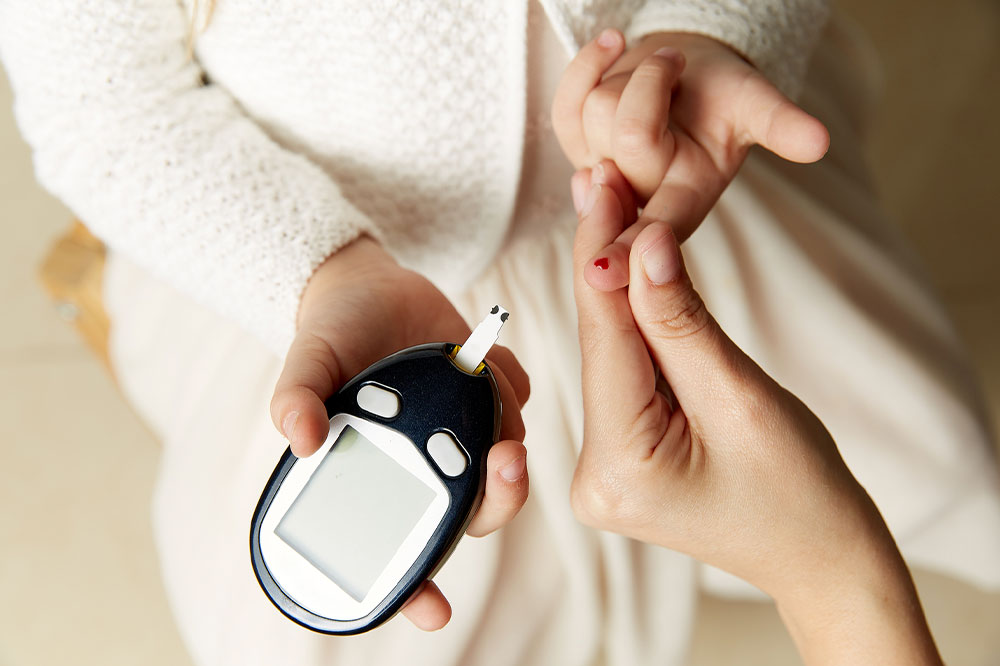How to reduce sugar intake and manage blood sugar

It is a known fact that too much sugar can be devastating for your health. When blood sugar is high, the body produces more insulin, which can lead to several health complications, including prediabetes and diabetes. So, you must cut down on sugar. Choosing healthy snacks and increasing fiber and probiotic intake can help. Moreover, regular exercise is essential. Here are a few tips to lower sugar intake and manage blood sugar levels naturally.
Avoid carbohydrates
A high intake of carbohydrates has a substantial impact on blood sugar levels. The body breaks down carbohydrates into sugars like glucose, which enters the blood. While the body requires glucose for energy, an excess can be harmful. As the amount of glucose increases, so does the amount of insulin produced by the body, leading to a greater risk of lifestyle disorders. Some foods with an abundance of carbs to stay away from are potato chips and donuts.
Control your portion size
If you are dealing with frequent blood sugar spikes, monitoring portion size can help. When you eat a large meal, blood glucose increases suddenly. To avoid this, eat smaller meals. You can opt for five to six small meals per day instead of two or three large ones. Use smaller plates, eat slowly, avoid going to restaurants, and keep a food journal. This will not only help manage high blood sugar but also reduce calorie intake, which has several benefits.
Consider foods rich in fiber
Fiber helps slow the digestion of carbohydrates and sugar absorption, gradually controlling blood sugar. Unsurprisingly, many people with type 1 diabetes can manage their condition better by including more fiber in their meals. Some foods high in fiber are fruits, vegetables, whole grains, and legumes. However, remember that too much fiber can also be a problem. Speak with a doctor to determine the right amount based on your condition.
Drink plenty of water
Drinking sufficient water helps keep blood sugar levels in check by flushing out excess sugar through urine. It helps rehydrate the blood, reduce the risk of diabetes, and lower blood sugar levels. But always drink plain water or zero-calorie drinks to manage high blood sugar. Reaching for sugar-sweetened beverages to quench your thirst can be counterproductive. It can raise blood glucose and increase the risk of diabetes. Artificial sweeteners in some drinks can also cause imbalances in gut bacteria, which can further cause poor blood sugar control. Besides managing blood sugar, water prevents dehydration, helping prevent several other ailments.
Opt for whole foods
Since whole foods are not processed or refined, you should add more to your meals to keep sugar levels in check. Opt for whole fruits, whole grains, vegetables, legumes, and meat that is free of additives and other artificial substances. Also, avoid ultra-processed foods, such as soft drinks, chips, sugary cereals, and fast food.
Avoid sugary desserts
Most desserts offer zero nutritional value and are loaded with sugar. They spike blood sugar levels and leave you feeling tired and hungrier. Items like cakes, donuts, pies, and ice cream are not meant to be had regularly as they can cause health concerns. Choose alternatives like fresh fruits, dark chocolate, Greek yogurt, and baked fruit with cream to satisfy your taste buds.
Choose full-fat foods
These days, many stores sell low-fat varieties of foods like yogurt, butter, and salad dressing. However, you may be surprised to learn that these have more sugar and sometimes more calories than full-fat alternatives. So, when you feel the need to cut down on sugar intake, go for full-fat foods. The fat content in these items is comparatively less harmful and makes you feel full.
Check the sugar levels in canned foods
Canned foods contain a lot of added sugar, so you should avoid them as far as possible. It is better to choose fresh fruits and vegetables instead of canned varieties because they have natural sugars, which can satiate your sugar needs. When at the grocery store, always check the labels of packaged items and buy those that use terms like “no added sugar” and “packed in water” to ensure healthy eating.
Make exercising a part of your routine
Besides good eating habits, focus on exercising to control high blood sugar. Regular exercise can help maintain physical fitness and increase insulin sensitivity. This means your body’s cells can effectively use the sugar in your bloodstream. Further, exercise helps the muscles to use blood sugar for contraction and energy. As a part of a healthy routine, you can also go for regular checkups before and after exercising. It will show the difference in metabolism and help you understand how your body reacts to different exercises to control blood sugar levels.
Follow a good sleep schedule
Getting enough sleep is necessary for good health. If you have poor sleeping habits, your blood sugar levels can increase. Sleep deprivation can also cause a spike in the stress hormone cortisol, which can upend the body’s blood sugar management. Further, it can cause an increase in appetite. Hence, those with high blood sugar must follow a good sleep schedule.
The above points demonstrate that excessive sugar consumption can harm your health. Other than a spike in blood sugar levels, sodas, sweets, and other processed food can cause diabetes, tooth decay, and even cancer and heart disease. So, they should be completely avoided. To control high blood sugar, engage in healthy practices like sleeping well, exercising regularly, following a balanced meal plan, drinking enough water, and more. You can live a happy and healthy life in the long run by changing your food habits and lifestyle. Be mindful of what you eat, and do not hesitate to talk to a doctor if you feel the need.
















